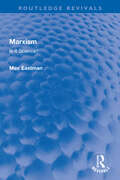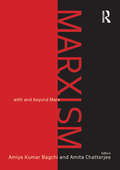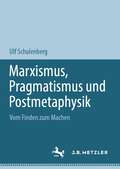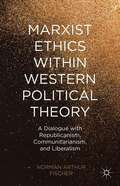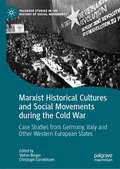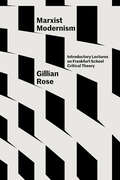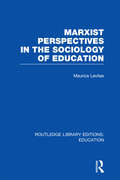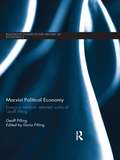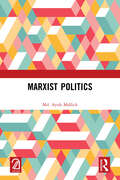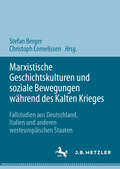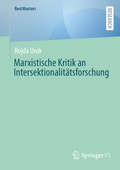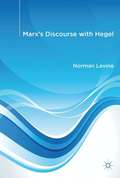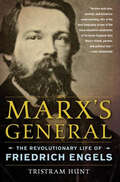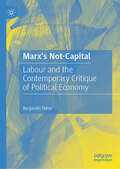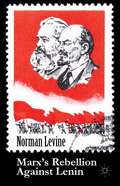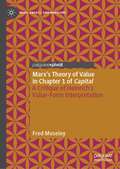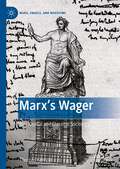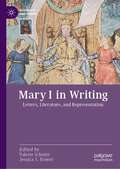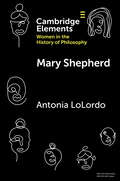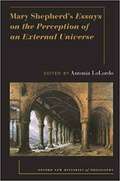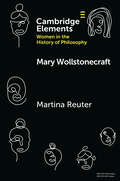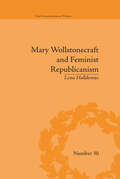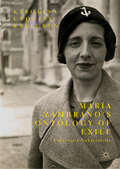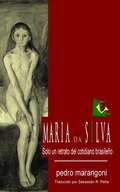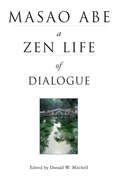- Table View
- List View
Marxism: Is it Science? (Routledge Revivals)
by Max EastmanFirst published in 1941, Marxism: Is it Science? was written to present the author’s criticisms of Marxism and, in doing so, to further exemplify his ‘Method of Instruction’ first proposed in an earlier work. The book is divided into six parts to provide six complete presentations of Marxism and why the author considers it unscientific. The six different approaches, varying in focus and complexity, work together to give the reader a detailed overview of Marxism and the authors critique of it.
Marxism: With and Beyond Marx
by Amita Chatterjee Amiya Kumar BagchiThis book offers a unique re-conceptualization of Marxism in bringing together leading scholars across disciplines — history, philosophy, economics, politics, sociology, and literary and culture studies — into one comprehensive corpus. It demonstrates the engaging relevance of the perspectives and techniques of the analyses adopted by Karl Marx, Frederich Engels and contemporary Marxists, and will be immensely useful to scholars and researchers across social sciences as well as general readers interested in Marxism.
Marxismus, Pragmatismus und Postmetaphysik: Vom Finden zum Machen
by Ulf SchulenbergVom Finden zum Machen bietet die erste ausführliche Diskussion über die Beziehung zwischen Marxismus und Pragmatismus. Diese beiden Philosophien der Praxis sind nicht unvereinbar, und eine Analyse ihrer Beziehung hilft, beide besser zu verstehen. Im Rahmen eines transatlantischen theoretischen Dialogs werden in diesem Buch Gemeinsamkeiten und Unterschiede zwischen diesen Philosophien erörtert. Es handelt sich um eine interdisziplinäre Studie, die Philosophie, amerikanische und europäische Geistesgeschichte und Literaturwissenschaft zusammenführt. Schulenbergs Buch zeigt, dass der Versuch, die Dialektik von Marxismus und Pragmatismus zu erhellen, ein guter Ausgangspunkt ist, wenn wir das unvollendete Projekt der Etablierung einer wirklich postmetaphysischen Kultur weiterführen wollen. Das Buch bietet detaillierte Diskussionen über Sidney Hook, Georg Lukács, Theodor W. Adorno, Fredric Jameson, W.E.B. Du Bois, John Dewey, Richard Rorty und Jacques Rancière.Die Übersetzung wurde mit Hilfe von künstlicher Intelligenz durchgeführt. Eine anschließende menschliche Überarbeitung erfolgte vor allem in Bezug auf den Inhalt.
Marxist Ethics within Western Political Theory
by Norman Arthur FischerAs widely applied as Marxist theory is today, there remain a host of key western thinkers whose texts are rarely scrutinized through a Marxist lens. In this philosophical analysis of Marx's never-before translated German notes on Machiavelli, Montesquieu, Rousseau, and Lewis Henry Morgan, Norman Fischer points to a strain of Marxist ethics that may only be understood in the context of the great works of Western political theory and philosophy particularly those that emphasize the republican value of public spiritedness, the communitarian value of solidarity, and the liberal values of liberty and equality.
Marxist Historical Cultures and Social Movements during the Cold War: Case Studies from Germany, Italy and Other Western European States (Palgrave Studies in the History of Social Movements)
by Stefan Berger Christoph CornelissenThis book explores the relationship between diverse social movements and Marxist historical cultures during the second half of the twentieth century in Western Europe, with special emphasis on the Federal Republic of Germany and Italy. During the Cold War, Marxist ideas and understandings of history informed not only the traditional Communist Parties in Western Europe, but also influenced a range of new social movements that emerged in the 1970s in the wake of the 1968 student rebellions. The generation of 1968 was strongly influenced by neo-Marxist ideas that they subsequently carried into the new social movements. The volume asks how Marxist historical cultures influenced third world movements, anti-fascist movements, the peace movement and a whole host of other new social movements that signaled a new vibrancy of civil society in Western Europe from the 1970s onwards.
Marxist Modernism: Introductory Lectures on Frankfurt School Critical Theory
by Gillian RoseLectures on art, Marxism, and critical theory by the legendary philosopher, collected for the first time, with an afterword by Martin JayMarxist Modernism is a comprehensive yet concise and conversational introduction to the Frankfurt School. It is also a new resource from one of the twentieth century&’s most important philosophers: Gillian Rose.Her 1979 lectures on the Frankfurt School explore the lives and philosophies of a range of the school&’s members and affiliates, including Adorno, Lukács, Brecht, Bloch, Benjamin, and Horkheimer, and outline the way each theorist developed Marx&’s theory of commodity fetishism into a Marxist theory of culture.Edited by Robert Lucas Scott and James Gordon Finlayson
Marxist Perspectives in the Sociology of Education (Routledge Library Editions: Education)
by Maurice LevitasThe major theories explored are those concerned with social mobility and those which derive from a relativist position in Sociology, both of which see education as a selection mechanism for a stratified society. Social class, family, sociolinguistics and schools are among the topics discussed. In this analysis the author: defines key areas in the sociology of education gives access to important concepts of Marx and Engels strengthens sociological starting points by adding a Marxist element discriminates between radically different directions in education maps the main features of long-term working class goals This thoroughgoing Marxist critique of widely prevalent notions in the sociology of education provides a compass by which place and direction in this area of education may be found by students, teachers and parents.
Marxist Political Economy: Essays in Retrieval: Selected Works of Geoff Pilling
by Geoff PillingGeoff Pilling’s work shows that Marxist theory is relevant to those struggling to understand the problems of capitalist society today, and that the work not only of Marx and Engels but that of later Marxist theorists, including Lenin is worth studying. It also shows that to understand the problems of today’s society needs more than narrow specialist economic analysis, but a deep awareness of current developments in society.
Marxist Politics
by Md. Ayub MallickThis book deals with the main doctrines of Marxist politics. Clearly and simply written, the book explores the views of classical Marxists along with the findings of Western and Analytical Marxists. It also shows a distinction between Marxist and non-Marxist views on politics. Their points of difference as well as their common roots are thus clearly accounted for. Marxist politics is a coherent system of ideas and theories of class, class struggle, party, revolution and the state developed in response to a series of major and interrelated changes – the emergence of a capitalist economy, the rise of the modern nation-state and the development of modern science, which transformed both the society and politics. This book is intended to explore these ideas and theories. Particular emphasis has been put on the ideas and views of critical Marxists in a separate chapter. The book includes brief bibliographical details of major individual thinkers as well as an annotated bibliography for further reading. Print edition not for sale in South Asia (India, Sri Lanka, Nepal, Bangladesh, Pakistan and Bhutan)
Marxistische Geschichtskulturen und soziale Bewegungen während des Kalten Krieges: Fallstudien aus Deutschland, Italien und anderen westeuropäischen Staaten
by Stefan Berger Christoph CornelissenIn diesem Buch wird die Beziehung zwischen verschiedenen sozialen Bewegungen und marxistischen Geschichtskulturen in der zweiten Hälfte des 20. Jahrhunderts in Westeuropa untersucht, wobei der Schwerpunkt auf der Bundesrepublik Deutschland und Italien liegt. Während des Kalten Krieges prägten marxistische Ideen und Geschichtsauffassungen nicht nur die traditionellen kommunistischen Parteien in Westeuropa, sondern beeinflussten auch eine Reihe neuer sozialer Bewegungen, die in den 1970er Jahren im Gefolge der Studentenrevolte von 1968 aufkamen. Die 68er-Generation war stark von neomarxistischen Ideen geprägt, die sie später in die neuen sozialen Bewegungen trug. Der Band geht der Frage nach, wie marxistische Geschichtskulturen die Bewegungen der Dritten Welt, die antifaschistischen Bewegungen, die Friedensbewegung und eine ganze Reihe anderer neuer sozialer Bewegungen beeinflusst haben, die ab den 1970er Jahren eine neue Lebendigkeit der Zivilgesellschaft in Westeuropa signalisierten.
Marxistische Kritik an Intersektionalitätsforschung (BestMasters)
by Rojda UrukWährend Anfang des 20. Jahrhunderts gesellschaftliche Ungleichheitsstrukturen vor allem durch marxistische Ansätze erklärt wurden und damit ein Objektivitätsanspruch einherging, bestimmen heute vor allem individualisierte Mikroanalysen die sozialwissenschaftliche Perspektive, die Ungleichheiten zwischen Individuen suchen und einen Subjektivitätsanspruch zentrieren. Marxismus und Intersektionalität scheinen manchen aktuell unvereinbar. Demgegenüber wird in diesem Buch gezeigt, dass die Intersektionalitätsforschung erst in Abgrenzung zum Marxismus entstehen konnte und sich daher die Differenzierungslinien beider in Theorie, Methodologie und Methode der Intersektionalität bis heute wiederfinden lassen. Deutlich wird, dass der Marxismus sich zwar mit der Intersektionalität (erneut) mit idealistischen Erklärungsversuchen gesellschaftlicher (Nicht-)Zusammenhänge konfrontiert sieht, seine Aktualität als Kritik aller Ungleicheitsverhältnisse aber nicht eingebüßt hat.
Marx’s Discourse with Hegel
by Norman LevineThe end of Stalinist Russia, China's change under Deng Xiaoping and the publication of previously unexplored documents of Marx in the MEGA2 opened a new epoch in the analysis of Marx. Marx's Discourse With Hegel is both a product and contribution to this rebirth of Marxism by its reformulation of the relationship between Hegel and Marx
Marx’s General: The Revolutionary Life of Friedrich Engels
by Tristram HuntFriedrich Engels is one of the most intriguing and contradictory figures of the nineteenth century. Born to a prosperous mercantile family, he spent his life enjoying the comfortable existence of a Victorian gentleman; yet he was at the same time the co-author of The Communist Manifesto, a ruthless political tactician, and the man who sacrificed his best years so that Karl Marx could have the freedom to write. Although his contributions are frequently overlooked, Engels's grasp of global capital provided an indispensable foundation for communist doctrine, and his account of the Industrial Revolution, The Condition of the Working Class in England, remains one of the most haunting and brutal indictments of capitalism's human cost. <p><p>Drawing on a wealth of letters and archives, acclaimed historian Tristram Hunt plumbs Engels's intellectual legacy and shows us how one of the great bon viveurs of Victorian Britain reconciled his exuberant personal life with his radical political philosophy. This epic story of devoted friendship, class compromise, ideological struggle, and family betrayal at last brings Engels out from the shadow of his famous friend and collaborator.
Marx’s Not-Capital: Labour and the Contemporary Critique of Political Economy
by Benjamin TetlerAs a contribution to critical social theory, this book reconsiders Marx’s critique of political economy through the concept of labour as “not-capital”. Engaging with thinkers who have dealt with Marx’s concepts of “not-capital” and “not-value”, Tetler examines whether and how these concepts can contribute significantly towards a renewal of the critique of political economy beyond the limits of traditional Marxism. In doing so he provides the first in depth interrogation of these concepts, both within Marx’s work itself and within and across the various intellectuals who have put them to use in their attempts to address the faults of traditional Marxism. He argues that the theory of value that sits at the heart of Marx’s critique of political economy requires a negative conception of labour. In helping establish this, the notions of labour as not-capital/value are shown to have formidable ramifications concerning the crisis-ridden nature of capitalist social relations and the struggles operative within and against them.
Marx’s Rebellion Against Lenin
by Norman LevineMarx's Rebellion Against Lenin, by negating the Leninist-Stalinist theory of dialectical materialism and tracing Marx's political philosophy to the Classical Humanism of Aristotle, overthrows the stultifying entrapment of Stalinist Bolshevism and contributes to the revitalization of Marx's method.
Marx’s Theory of Value in Chapter 1 of Capital: A Critique of Heinrich’s Value-Form Interpretation (Marx, Engels, and Marxisms)
by Fred MoseleyChapter 1 is the most important chapter in Capital, as well as the most difficult and the most controversial. An influential interpretation of Chapter 1 in recent decades has been the so-called “value-form interpretation” of Marx’s theory in general and Chapter 1 in particular. The most important proponent of the value-form interpretation today, both in Germany and in the English-speaking world, is Michael Heinrich, and Heinrich’s work has emphasized the first chapter. Heinrich’s latest book in English is a detailed commentary of the first seven chapters of Volume 1 of Capital. The publication of an English translation of Heinrich’s book is an important event in Marxian scholarship and it is important to critically engage with this important book in order to advance our understanding of this critical foundational chapter. This book emphasizes the quantitative issue of whether the magnitude of value and socially necessary labour-time are determined in production or also depend on exchange and demand, which has been the main issue in the controversy over the value-form interpretation.
Marx’s Wager: Das Kapital and Classical Sociology (Marx, Engels, and Marxisms)
by Thomas KempleMarx's masterpiece Capital (Das Kapital) ignored or misread as well as selectively and creatively interpreted by the generation of social scientists that came after him. Emile Durkheim, Max Weber, and Georg Simmel attempt to supplement what they call ‘historical materialism’ or to engage in debates about ‘socialism’ through their readings of The Communist Manifesto and occasional Capital. Although these and other classical sociologists did not have access to most of Marx’s published and unpublished works as we do today, each is concerned with revising and refining Marx’s unfinished critique of political economy. Despite their differences with Marx and with one another, they share his concern with how empirically detailed and scientifically valid knowledge of the social world may inform historical struggles for a more human world. This commitment can be called ‘Faustian’, after the title character of the poet J. W. von Goethe’s tragic epic of modernity, insofar as Marx and the classical sociologists hope to translate theory into practice while making a pact or wager with the diabolical social, political, and economic forces of the modern world.
Mary I in Writing: Letters, Literature, and Representation (Queenship and Power)
by Valerie Schutte Jessica S. HowerThis book—along with its companion volume Writing Mary I: History, Historiography, and Fiction—centers on representations of Queen Mary I in writing, broadly construed, and the process of writing that queen into literature and other textual sources. It spans an equally wide chronological and geographical scope, accounting for the years prior to her accession in July 1553 through the centuries that followed her death in November 1558 and for her reach across England, and into Ireland, Spain, Italy, Russia, and Africa. Its intent is to foreground words and language—written, spoken, and acted out—and, by extension, to draw out matters of and conversations about rhetoric, imagery, methodology, source base, genre, narrative, form, and more. Taken together, these two volumes find in England’s first crowned queen regnant an incomparable opportunity to ask new questions and seek new answers that deepen our understanding of queenship, the early modern era, and modern popular culture.
Mary Shepherd (Elements on Women in the History of Philosophy)
by Antonia LoLordoThere has recently been a resurgence of interest in the early nineteenth century Scottish philosopher Mary Shepherd. This Element is intended to provide an overview of Shepherd's system, including her views on the following wide range of topics: causation, induction, knowledge of the external world, matter, life, animal cognition, the relationship between mind and body, the immortality of the soul, the existence of God, miracles, and the nature of divine creation. The author also provides an overview of relevant secondary literature and argues for their own interpretation of Shepherd's metaphysics.
Mary Shepherd's Essays on the Perception of an External Universe
by Antonia LolordoThis is the first modern edition of the works of Lady Mary Shepherd, one of the most important women philosophers of the early modern period. Shepherd has been widely neglected in the history of philosophy, but her work engaged with the dominant philosophers of the time - among them Hume, Berkeley, and Reid.<P><P> In particular, her 1827 volume Essays on the Perception of an External Universe outlines a theory of causation, perception, and knowledge which Shepherd presents as an alternative to what she sees as the mistaken views of Berkeley and Hume. What she ultimately presents is an original and systematic metaphysics and epistemology. Shepherd's Essays consists of two parts. The first is a theory of perception and knowledge of the external world, which is designed to rebut idealism and skepticism about the external world and show that our ordinary beliefs are based on reason. The second is a collection of essays on topics in metaphysics and epistemology, including the immateriality and eternity of the mind, the relationship between mind and body, the possibility of miracles, the association of ideas, the relationship between physical and mathematical reasoning, and the epistemology of testimony. <P><P>Antonia LoLordo's edition of Shepherd's Essays includes scholarly notes throughout the text that provide historical and philosophical context and expand on the major concepts of Shepherd's system. Her extensive introduction to Shepherd's life and works surveys some of the major points of Shepherd's system, points out directions for future research, and offers guidance for readers planning to teach her work in their courses. This volume is an invaluable primary resource for scholars, graduate students, and undergraduates interested in metaphysics, epistemology, and early modern philosophy.
Mary Wollstonecraft (Elements on Women in the History of Philosophy)
by Martina ReuterMary Wollstonecraft is recognized as an important early feminist. This Element argues that she is also an ingenious moral philosopher, who showed that true virtue and the liberty of women are necessarily interdependent. The Element consists of eight sections. After an introduction, Section 2 discusses Wollstonecraft's concept of reason by examining its metaphysical foundation and its role as moral capacity. According to Wollstonecraft, reason interacts closely with the passions. Then, Sections 3 and 4 discuss the roles of the passions and the imagination. Reason, passion and imagination all come together in Wollstonecraft's discussions of love and friendship, which are the topic of Section 5. Wollstonecraft values education and knowledge, but discussions of her epistemology have been rare. Section 6 analyses some aspects of her views on knowledge. Finally, Section 7 discusses Wollstonecraft's notion of virtue, including its relations to liberty and duty. Section 8 makes some general conclusions.
Mary Wollstonecraft and Feminist Republicanism: Independence, Rights and the Experience of Unfreedom (The Enlightenment World #30)
by Lena HalldeniusMary Wollstonecraft is a writer whose work continues to provoke scholarly debate. Halldenius explores Wollstonecraft’s political philosophy, focusing on her treatment of republicanism and independence, to propose a new way of reading her work – that of a ‘feminist republican’.
María Zambrano’s Ontology of Exile: Expressive Subjectivity
by Karolina Enquist KällgrenThis book analyzes the exile ontology of Spanish philosopher María Zambrano (1904-1991). Karolina Enquist Källgren connects Zambrano’s lived exile and political engagement with the Spanish Civil War to her poetic reason, and argues that Zambrano developed a theory of expressive subjectivity that combined embodiment with the expressive creativity of the human mind. The analysis of recurring literary figures and concepts—such as new materialism, the confession, image, the ruin, the heart, and awakening— show how a comprehensive argument runs as a thread through her works. Further, this book situates Zambrano’s thought in a larger European philosophical context by showing how Zambrano’s poetic reason was directly related to her unconventional exile readings of Martin Heidegger, Aristotle, Immanuel Kant, and Xavier Zubiri, among others.
María da Silva, solo un retrato del cotidiano brasileño
by Pedro Marangoni Sebastián Rodolfo PeñaPresentación No se puede afirmar que “María da Silva” sea un trabajo de ficción puesto que es un retrato del cotidiano sin retoques. Un pequeño libro sobre la corta vida de una buscadora de basura en Brasil. No hay descripciones superfluas, de ese modo el lector compondrá el ambiente leyendo el drama com el escenario que conoce, que sucede cerca suyo, que ve en su día a día y cuya rigidez desconoce. Diariamente “Marías da Silva” mueren de inanición y de enfermedades no tratadas, en una breve tragedia pasada en la vida, llevándose consigo toda una historia ignorada por los demás ciudadanos. Ya es hora de verlas como seres humanos y este pequeño libro puede ayudar. Siento que la obra no es mía, solamente soy el presentador del mensaje de María da Silva. Creo que si algunos lectores después de conocerla cambien, aunque sea la mirada frente a los buscadores de basura – que buscan lo despreciado, no piden limosna - la misión que me confiaron por casualidad habrá sido cumplida.
Masao Abe a Zen Life of Dialogue
by Donald W. MitchellMasao Abe: A Zen Life of Dialogue is a compilation of essays that cover the life and work of Masao Abe, perhaps one of the greatest Zen Buddhist communicators of the twentieth century. Masao Abe has opened up a rich dialogue between Japan and the West. He is considered the leading living Zen figure in the Kyoto School of Buddhist thought and the successor of D.T. Suzuki, his early mentor, as the foremost exponent of Zen Buddhism in the West.Through stories and recollections, thrity-five leading intellectual figures explore Abe's encounter with the West, including his work on interfaith dialogue as a basis for world peace as well as his comparative philosophical scholarship over the past thirty years. This book is a retrospective and an extra ordinary step ahead in the encounter between Zen and the West.
